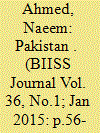| Srl | Item |
| 1 |
ID:
137944


|
|
|
|
|
| Summary/Abstract |
In an era of international relations that is increasingly characterised by complexity and uncertainty, as well as a growing domestic reluctance to become ‘entangled’ abroad, the military options for political leaders in dealing with emerging crises appear to be dwindling. However, in this article Peter Roberts avers that there is one element of the British armed forces – its amphibious capability – that is relatively under-used as currently configured. If transformed into smaller, more frequently forward-deployed and capable units, amphibious forces could offer politicians an alternative option in crisis situations, and especially in those that emerge in the complex environment of the littoral.
|
|
|
|
|
|
|
|
|
|
|
|
|
|
|
|
| 2 |
ID:
126443


|
|
|
|
|
| Publication |
2013.
|
| Summary/Abstract |
This article investigates the military approach as a means of solving protracted civil conflicts, in particular focusing on the cases of Sri Lanka and Colombia in comparison. The approach adopted is to study the emergence of these military options within the context of each country's history and to assess whether the call for war was merely a consequence of the international 'war on terror', or driven by internal elements. The article explores the epistemological groundings and pitfalls of the all-out war theory informing this approach, before reassessing the significance and validity of the theory in relation to Sri Lanka and Colombia.
|
|
|
|
|
|
|
|
|
|
|
|
|
|
|
|
| 3 |
ID:
127454


|
|
|
|
|
| Publication |
2014.
|
| Summary/Abstract |
IN HIS BOOK Diplomacy, Henry Kissinger concludes that the United States "faces the challenge of reaching its goals in stages, each of which is an amalgam of American values and geopolitical necessities."1 The recent debates about U.S. military options in Libya and Syria reflect the enduring tension between these intertwined, at times competing components of our external relations. No U.S. statesman can ignore this dilemma, and none will find it easy to strike exactly the right balance between the two, especially in times of crisis.
|
|
|
|
|
|
|
|
|
|
|
|
|
|
|
|
| 4 |
ID:
087618


|
|
|
|
|
| Publication |
2009.
|
| Summary/Abstract |
India has demonstrated restraint and maturity in wake of bothe the Parliament and the Mumbai attacks. It has not allowed the calibration of its policy to be hijacked by war hysteria.
|
|
|
|
|
|
|
|
|
|
|
|
|
|
|
|
| 5 |
ID:
140306


|
|
|
|
|
| Summary/Abstract |
This paper critically examines the counterterrorism strategy of Pakistan, which it adopted after the 9/11 incident, by arguing that so far, it has proved ineffective and counter-productive in uprooting the terrorist network of Pakistan-based militant Jihadi and extremist groups that also have links with Al-Qaeda. In this respect, the paper, besides defining and assessing Pakistan’s counterterrorism strategy, also analyses various factors which have contributed to the inefficacy of the country’s counterterrorism strategy. In the concluding analysis, the paper emphasises upon the need for formulating an effective counterterrorism strategy of Pakistan.
|
|
|
|
|
|
|
|
|
|
|
|
|
|
|
|
| 6 |
ID:
175515


|
|
|
|
|
| Summary/Abstract |
Perhaps the most significant foreign policy decision facing the United States is whether to retain its global security commitments or retrench from key regions. Although primacists are optimistic that the United States will remain ahead of its rivals, restrainers are more pessimistic about its prospects. I argue instead that this debate overlooks the importance of geopolitical orientation. Maritime powers such as the United States are frequently in competition with multiple adversaries at once. This introduces an interdependent commitment problem that makes primacy difficult to sustain and dangerous to enforce, especially given the propensity to employ similar military approaches against different opponents. At the same time, maritime powers experiencing decline can respond in ways that fall short of retrenchment. This is mainly because their naval forces provide many options for upholding their obligations. Applied to the United States, these arguments suggest Washington might choose to diversify its defense strategy rather than abandon its commitments. In the Middle East, for example, it could rely on punishment via naval blockade rather than denial against Iran, not only because the former strategy would require fewer high-value military assets than the latter but also because it might allow the United States to avoid the types of clashes that would undermine its position relative to higher-priority threats.
|
|
|
|
|
|
|
|
|
|
|
|
|
|
|
|